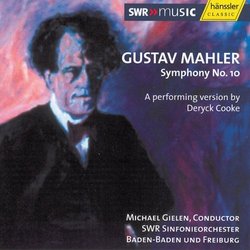| All Artists: Gustav Mahler, Michael Gielen, Baden-Baden & Freiburg SWR Symphony Orchestra Title: Mahler: Symphony No. 10 (Performing Version by Deryck Cooke) Members Wishing: 0 Total Copies: 0 Label: Hanssler Classics Original Release Date: 1/1/2006 Re-Release Date: 1/10/2006 Genre: Classical Styles: Historical Periods, Modern, 20th, & 21st Century, Symphonies Number of Discs: 1 SwapaCD Credits: 1 UPCs: 040888312420, 040888312420 |
Search - Gustav Mahler, Michael Gielen, Baden-Baden & Freiburg SWR Symphony Orchestra :: Mahler: Symphony No. 10 (Performing Version by Deryck Cooke)
 | Gustav Mahler, Michael Gielen, Baden-Baden & Freiburg SWR Symphony Orchestra Mahler: Symphony No. 10 (Performing Version by Deryck Cooke) Genre: Classical "Michael Gielen's Mahler cycle is now complete, and as predicted it moves straight to the top of the list as the most idiomatic and consistent single set currently available." -CLASSICSTODAY Michael Gielen's Mahler interp... more » |
Larger Image |
CD DetailsSynopsis
Album Description "Michael Gielen's Mahler cycle is now complete, and as predicted it moves straight to the top of the list as the most idiomatic and consistent single set currently available." -CLASSICSTODAY Michael Gielen's Mahler interpretations have attained an almost cult status among collectors. Mahler's deeply personal 10th Symphony, never completed, but realized for performance by Mahler/Bruckner expert Deryck Cooke, has been the subject of discussion and controversy since Mahler's death. Similar CDs
|
CD ReviewsA recording to cherish! MartinP | Nijmegen, The Netherlands | 07/15/2006 (5 out of 5 stars) "Many big-name conductors still piously avoid the performing version of Mahler's Tenth, but fortunately many others, from Rattle to Chailly, don't. Thanks to the latter, the Cooke edition is now firmly established as part of the repertoire, effectively extending the Mahler canon to eleven symphonies. And rest assured that its final instalment is no half-hearted attempt or an underdeveloped premature child - this is very potent and fascinating music, bone-chilling, heart-wrenching, and deeply comforting in turn. Moreover, it completely overturns the common perception of the Ninth as a valedictory work, and ruthlessly but movingly reveals the composer's deep and tormented love for his adultrous wife. Michael Gielen is just the man for this kind of work. His approach is clearsighted and unsentimental. He does not cover up its unfinished state with overblown demagogics - yet, through his great affinity with 20th century music, he delves deeper into the many audacious and forward-looking details that pepper this opus than any other conductor I've heard. The opening adagio is, maybe, a tad cool and aloof compared to some others, and the great, organlike outbreak does not come with the welter of sound heard from a Chailly, but its atmosphere of loneliness and uncertainty is poignant to say the least. The first scherzo is controlled but in no way inhibited, ideally paced, and crowned by a raucous climax. The sheer delicacy of the subsequent brief Purgatorio movement is breathtaking - among the six or so versions I know of the Tenth, this is easily the most beautiful performance of that piece. The horrific graveyard dance that follows in the second scherzo can never have sounded more frightening. The violence of the very loud drum strokes then opening the Finale are a contentious choice - most conductors nowadays opting for a more realistic emulation of a muffled drum heard from afar - but of course they engender huge drama. If you can listen to the ensuing flute melody with dry eyes, your tear ducts must be clogged. Played as it is by these musicians, it is one of the most intensely moving things you will ever hear.The entire finale is the high point of this recording, its seperate sections perfectly balanced, the anguish from the adagio slowly creeping in, then bursting out in two repeats of the full atonal chord from the first movement. The sustained trumpet note stringing these chords together is not only executed to perfection, but even gets a dynamic hairpin profile I haven't heard before and which is greatly effective. Then, with the entire orchestra picking up the flute melody, Gielen gives us something like the musical equivalent of a perfect late summer sunset, and we drift away in sheer bliss - a bliss he refuses to disturb with an overstated surge when the violins leap up one last time and the entire ensemble follows suit. Here, it is more like a final, contented sigh. The playing of the SWR orchestra is faultless, dedicated and consistently beautiful. So is the recording, which is warm and involving while retaining an analytical clarity unmatched in any of the other recordings I know. In all, this Mahler X is as good as any, better than most, and in the finale it arguably surpasses them all. " Sorry, but I just don't agree B. Guerrero | 12/24/2006 (3 out of 5 stars) "I'm going to be the dissenting voice here, and I'll give you precise reasons as to why. The second and third movements are totally prosaic. The poor little "Purgatorio" movement, in particular, really gets short changed under Gielen's direction. It's simply too fast and too light. What Gielen IS good at, is anything that sounds even remotely like the second Viennese school composers: Schoenberg, Berg, and Webern. As a result, the fourth movement (second scherzo) is extremely good, as is the centrally placed development section of the fifth movement, which is capped off with an unusually huge splash on the tam-tam (I think Carpenter puts that tam-tam smash in the right place, but more on that below). But just as with Rattle's first M10 recording with Birmingham, Gielen's solo bass drum shots at the start of the fifth movement are just absurdly loud - totally unmusical (Rattle addressed this shortcoming in his Berlin remake). Also, as with so many recordings of the Cooke version, the back half of the fifth movement just lays prostrate - almost passionless. Sorry, but I'll take the old Ormandy over the Gielen anyday. His Philly string section beats the pants off of Gielen's, and his inner movements are simply more consistant. Gielen strikes me as a tad insincere, except during those more "expressionistic" moments. As an addendum, I recommend - take a deep breath now! - the Carpenter version as recorded by Andrew Litton/Dallas S.O. on Delos. Yes, it's totally wild and wooly, and takes a good amount of getting used to. But not only is it much more filled out than the Cooke version, it addresses several of the work's major issues that really none of the other performing versions do. But for Cooke, Ormandy rules in my book." Fantastic Mahler from Michael Gielen! R. Hutchinson | a world ruled by fossil fuels and fossil minds | 07/04/2006 (5 out of 5 stars) "The "performing version" of Mahler's 10th, completed by Deryck Cooke and first performed in 1964 in London by the LSO, is a strange hybrid. It is not a fragment -- at 77 minutes as here performed by Gielen and his Southwest German Radio Symphony, it contains every bar sketched by Mahler. But it does not claim to be complete either, it leaves the incomplete 2nd, 4th and 5th movements as skeletons rather than, as in some other versions, filling in all the parts. Michael Gielen, long devoted to Mahler, was converted to Cooke's score. He says of the 23-minute finale:
"The arranger was obviously inspired by Mahler's spirit. It also conveys the impression that Mahler, after all the cries of pain in the previous movements, here discovers a clarified, resigned outlook toward death..." Mahler's 9th Symphony is widely seen to conclude with the death of the protagonist, and Mahler had long been obsessed with death, so it is no surprise that death continued to figure in the 10th, which he was working on when he finally did actually die in 1911. But it is not a grim work by any means, rather it is lovely and moves through many different moods, as do all Mahler's symphonies. Gielen's unerring sense of symphonic structure, along with his deep understanding of Mahler's music and intentions make possible an exceptional reading of this controversial score. Clearly if you are going to hear only one recording of Mahler's 10th, this is the one!" |

